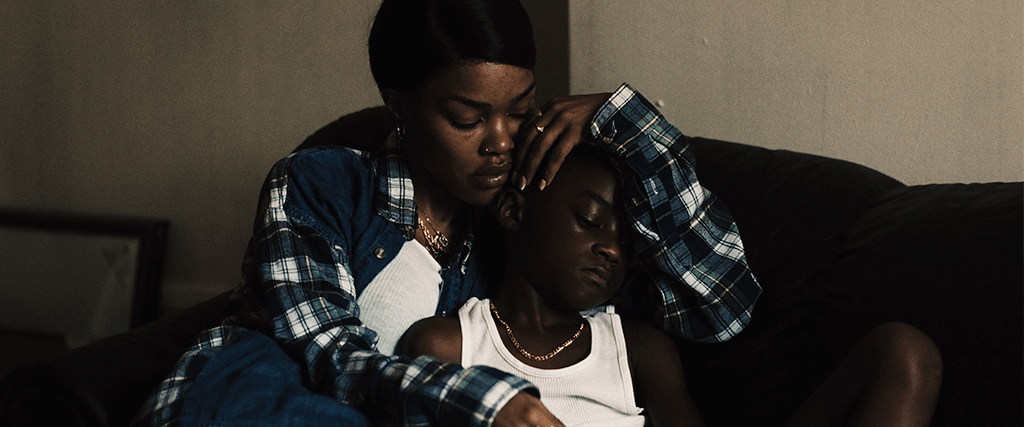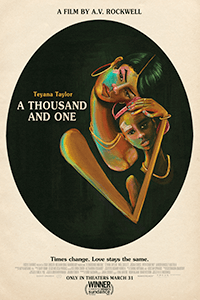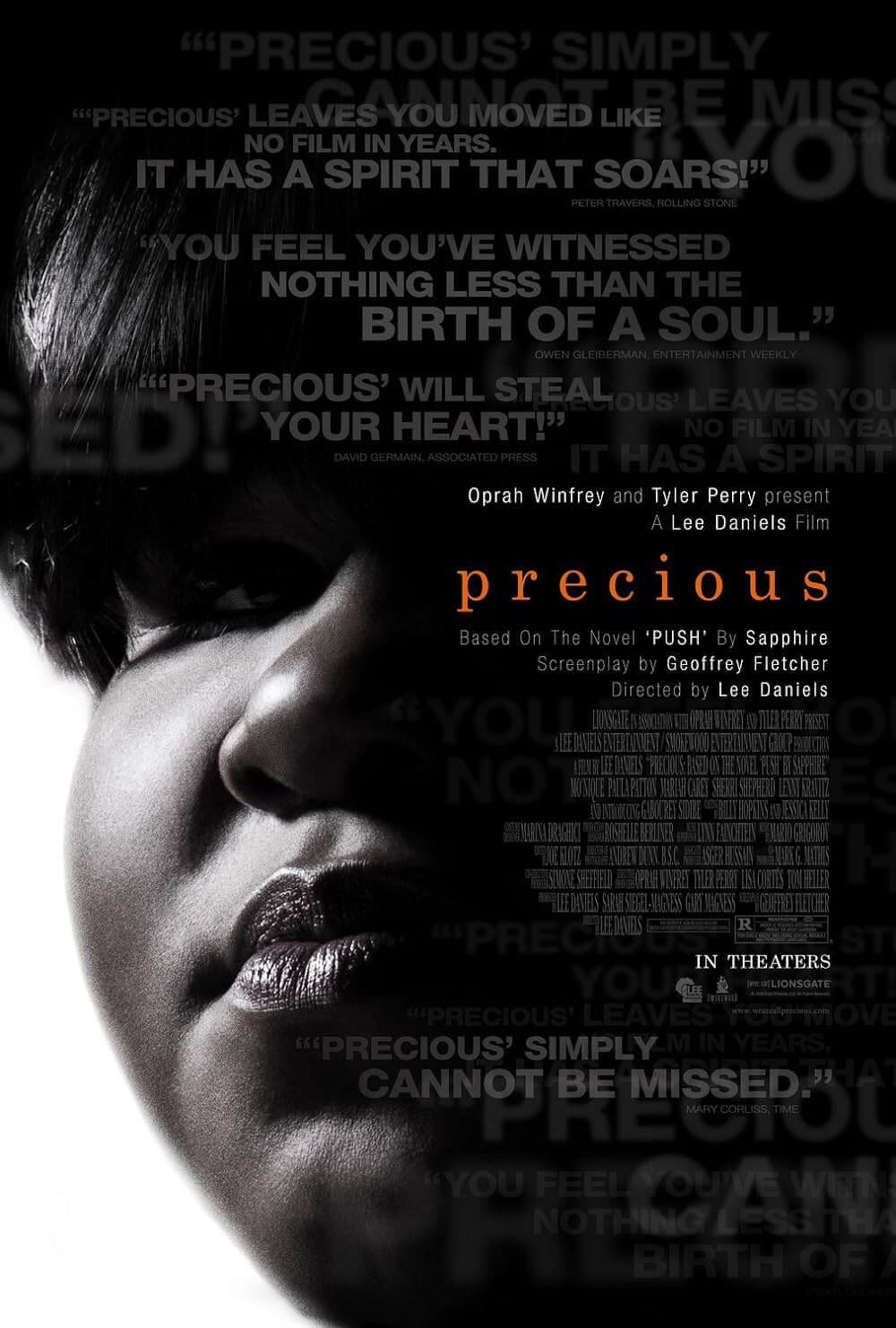
A Thousand and One
By Brian Eggert |
A Thousand and One takes its title from the apartment number where Inez, played by Teyana Taylor in a striking performance, moves with her son in 1994. Apartment “10-01” is missing the metal dash in-between the floor and room numbers; it also signifies the eventual flip-flopped identities of the film’s characters and their Harlem surroundings over the narrative’s ensuing years. The 22-year-old woman has just been released from prison on Riker’s Island and vows to change her life. She returns to her former stomping grounds in Brooklyn, where she sees Terry, her 6-year-old son who has since been in foster care. In his mother’s time away, Terry seems to resent Inez for abandoning him. But Inez’s apparent devotion to the boy—“I’ll go to war for you,” she tells him—prompts her impulsive choice to snatch Terry after an accident lands him in the hospital. Used to fighting the world in response to her hard upbringing, Inez goes into fierce protection mode, shielding Terry from a system and city quick to forget about people of color. A Thousand and One portrays motherhood, family, and home as complex and uneasy concepts, and it’s told with such authenticity and passion that the film’s power is impossible to deny.
Written and directed by A.V. Rockwell, who makes her feature debut after years of helming music videos and short films, the narrative contains a rich integration of realistic characters within a sociopolitical backdrop that layers the drama. However cliché it might sound, New York is another character, and mayors Rudy Giuliani and Mike Bloomberg’s deployment of “stop and frisk” policies and gentrification initiatives impact Inez and Terry’s lives. In the beginning, the setting of trash-strewn sidewalks and bodegas looks gritty courtesy of cinematographer Eric K. Yue’s visible grain, leaving A Thousand and One to resemble a convincing replica of a 1990s independent film. Later, the softer digital sheen and presence of name-brand storefronts announce that times have changed. Terry changes too. He’s played at ages 6, 13, and 17 by Aaron Kingsley Adetola, Aven Courtney, and Josiah Cross, respectively—a tactic that has earned deserved comparisons to Barry Jenkins’ Best Picture-winning drama, Moonlight (2016). However, the leaps in time seen in Jenkins’ film better warranted different actors. Here, the change from Courtney to Cross seems like too vast a difference in four years, aside from its symbolic intent.
Nevertheless, Rockwell delivers an assured first film, anchored by Taylor, the R&B performer who has since stepped into television acting and a few minor movie roles. A Thousand and One marks her first time as a lead, offering a warts-and-all portrait of Inez. Given her fiery performance, Taylor’s character never pretends that she’s a benevolent mother who always has the right advice and bottomless reserves of patience. Rather, she can be downright unpleasant at times. Accustomed to fending for herself, she struggles to be nurturing early on, yelling at Terry over toys, swearing at him, or slapping him across the face. But she’s determined to give her son every chance she didn’t have, promising, “There’s more to life than fucked up beginnings.” The upbringing she gives Terry isn’t always ideal—after all, a mother taking her child who is a ward of the state is a form of kidnapping (signaled by a scene where the two read P.D. Eastman’s Are You My Mother?). Perhaps the ends justify the means. After all, Terry survives a hard life in Harlem amid rampant social change and never falls victim to the many forces that might prey upon him (police profiling, drugs, et al.). Instead, his mother’s unwavering commitment to her cause means Terry will attend an advanced high school that could lead to an Ivy League college.
Nothing is easy or contained in tidy packages in A Thousand and One. But Rockwell doesn’t pass judgment or wag her finger at her characters’ choices; she considers the gradations of their lives. Take Inez’s eventual husband, Lucky (William Catlett), an old boyfriend whose unfaithfulness to Inez doesn’t mean he’s written out of her life, not even after he disappears for weeks. Sensitively played by Catlett, the role suggests that both husband and wife have secrets, but they accept that about each other. Despite Lucky’s frequent absences, he cares for Terry and provides him with an example of how to behave with sincerity and respect toward women. When he later contracts cancer, Terry loses the closest person he had to a father figure, even though the relationship far from the traditional father-son dynamic. Inez also has more to offer than her hotheaded instinct to literally fight every battle or shout her way through various situations. Over time, Rockwell ages Taylor by making her look ever more tired and pale, and some of the fight goes out of the character. She doesn’t even argue with her usual volatility when her new landlord tries to find an excuse to get them out of their apartment. But in the end, perhaps she doesn’t fight back because she’s already earned a victory. She tells Terry, “I won—because you’re gonna grow up to be somebody.”
Taylor and the performers playing Terry, Courtney above all, bring Rockwell’s characters to life, sometimes despite the screenplay. But the dialogue occasionally resorts to platitudes (“Damaged people don’t know how to love each other,” Inez observes) and overly melodramatic flourishes, making the film feel like a stage drama adapted into cinematic social realism. The two tones can sometimes feel at odds. A late confrontation between Inez and Terry, performed by Taylor and Cross, proves at once powerful and teetering on overwrought, given Cross’ voice-cracking performance and the script’s heavy-handed lines. And a late twist takes away from the otherwise grounded dramaturgy. Still, it’s a powerful and complex portrait of a Black woman in the first half that becomes less compelling when the story recenters on Terry in the second. And A Thousand and One also announces Rockwell as a promising talent, capable of finding nobility and pathos in a character who learns to fight for herself, regardless of how her choices look on paper. Taylor brings the character to life in a performance that will stay with you long after the end credits.

Consider Supporting Deep Focus Review
I hope you’re enjoying the independent film criticism on Deep Focus Review. Whether you’re a regular reader or just occasionally stop by, please consider supporting Deep Focus Review on Patreon or making a donation. Since 2007, my critical analysis and in-depth reviews have been free from outside influence. Becoming a Patron gives you access to exclusive reviews and essays before anyone else, and you’ll also be a member of a vibrant community of movie lovers. Plus, your contributions help me maintain the site, access research materials, and ensure Deep Focus Review keeps going strong.
If you enjoy my work, please consider joining me on Patreon or showing your support in other ways.
Thank you for your readership!
Brian Eggert | Critic, Founder
Deep Focus Review







